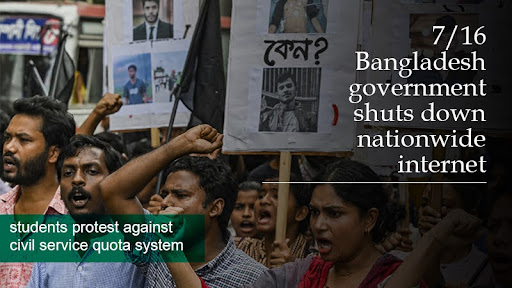7/16 Bangladesh government shuts down nationwide internet: students protest against civil service quota system
 2024-07-31
2024-07-31
Roots of Unrest: Job Quotas Spark Nationwide Protests
Bangladesh has been rocked by weeks of intense protests over a controversial quota system for public service jobs. The system, which reserves 30% of government positions for family members of freedom fighters from the 1971 War of Independence against Pakistan, has ignited outrage among students facing dire employment prospects. With nearly 32 million young people out of a total population of 170 million neither working nor in school, the quota system has become a flashpoint for widespread discontent. The protests reflect deep-seated frustrations with high youth unemployment and limited opportunities in the South Asian nation.
Government Crackdown: Universities Closed, Curfew Imposed
Demonstrations took a violent turn this week, with thousands of anti-quota protesters
clashing
with members of the ruling Awami League party across the country. In response to the
escalating
unrest, police used rubber bullets and tear gas to disperse the crowds. On July 16, the
Bangladesh University Grants Commission ordered all universities to close indefinitely,
citing
security concerns. The government has taken further stringent measures, imposing a
nationwide
curfew and even shutting down Internet services across the country to prevent relevant
information from leaking out.
What’s even more surprising is that the police were reportedly authorized to “shoot to kill”
during curfew hours. Although Dhaka's streets appear calmer following these measures, there
is
still a heavy military and police presence. In a major development, the Supreme Court on
July 21
ruled to reduce the percentage of reserved public vacancies from 56% to 7%, leaving 93% of
the
posts open to the public.
Rising death toll and international concern
According to the latest news, the Bangladesh government's violent suppression of the student
movement has resulted in the death of at least 133 people and the arrest of more than 500
people, including many opposition leaders. Faced with this brutal crackdown, student
protesters
on Monday announced a conditional suspension of demonstrations.
The escalating crisis has attracted international attention, and 83-year-old Bangladeshi
Nobel
Peace Prize winner Muhammad Yunus issued an urgent appeal to the international community. "I
urgently call on international leaders and the United Nations to do all they can to end the
violence suffered by those who exercise their right to demonstrate," Yunus said. As
Bangladesh
grapples with the unprecedented unrest, Prime Minister Sheikh Cheah, who has been in power
for
15 years, Sheikh Hasina's authoritarian government faces its most significant challenge yet.
In fact, since the outbreak of Covid-19, Bangladesh's economy has fallen into a severe
recession
and has not yet recovered to its previous level. In Bangladesh, tens of millions of people
are
facing unemployment and financial difficulties, and the entire country is also facing
inflation
that continues to hit new records. Recently, the U.S. State Department also raised the
travel
advisory for Bangladesh to level four, calling on people not to travel to Bangladesh, and
authorizing local non-emergency U.S. government employees and their families to leave
Bangladesh
if they wish, all because of the out-of-control civil unrest there.
Popular News

Bitpace: Revolutionizing Digital Payments with Comprehensive Solutions and Unmatched Security
Since its inception in 2016, Bitpace has emerged as a leading fintech company dedicated to revolutionizing the way digital payments are managed.

BJ88 Becomes AFC Bournemouth's New Jersey Sponsor in Landmark Premier League Deal
BJ88, an international foundation, has officially announced its partnership as the new jersey and trademark sponsor of AFC Bournemouth Football Club in the 2024-25 Premier League.

Big Gaming Set to Shine at ICE 2025 Barcelona
Big Gaming, a prominent gaming solutions provider based in Asia, is renowned for its stable and renowned systems, specializing in high-quality, secure products.